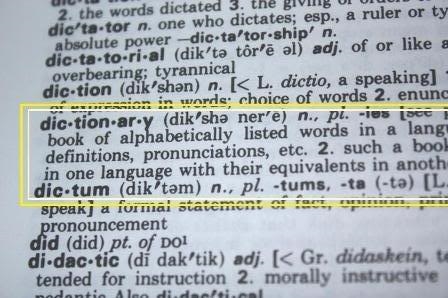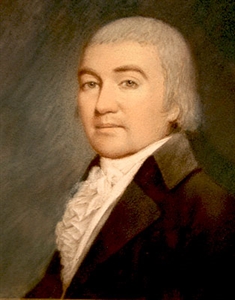Dictionary Day 2024 is on Wednesday, October 16, 2024: Why was D-Day called that?
Wednesday, October 16, 2024 is Dictionary Day 2024. Free posters ! Download a poster jpg here.

A day for lexicographers anywhere, Dictionary Day started to commemorate the accomplishments and contributions of Noah Webster-- the father of the modern thesaurus. Why not take the opportunity to learn some brand-new words?

Dictionary: D-day
The unnamed day on which an operation or offensive is to be launched.
The day on which the Allied forces invaded France during World War II (June 6, 1944).
[D (abbr. of DAY) + DAY.]
Word Origin: D-Day
Origin: 1918
The Yanks were coming! In April 1917, after three years of the Great War that was consuming Europe, we abandoned our neutrality and declared war on Germany, the country we saw as the aggressor. By June of that year, the first units of the American Expeditionary Force reached the battlefields of France. The A.E.F. provided much assistance to the French and British, and victory was achieved and an armistice declared the next year, on the eleventh day of the eleventh month of 1918.
Because we were last on the battlefield, most of the military vocabulary added to our language during World War I came from the British, like the name of the new military vehicle the tank. But apparently it was the Americans who contributed a technical term that would become famous a quarter of a century later, during World War II. Field Order No. 8 from the First Army of the A.E.F., of September 7, 1918, begins, "the First Army will attack at H-Hour on D-Day with the object of forcing the evacuation of the St. Mihiel salient."
The British used zero hour in discussion of an operation whose time was not yet determined or to be kept secret, but Americans preferred H-Hour and D-Day. In the next World War, with American general Dwight Eisenhower in supreme command, the term for the first day of the Allied invasion of France, June 6, 1944, was the American D-Day. That D-Day was and is so famous that it successfully invaded our general vocabulary to become a term that can refer to any day of action or decision. Other letters were combined with Day to give similar emphasis to a particular day, such as V-E Day and V-J Day for the 1945 endings of the war in Europe and Japan, respectively, and E Day for "Education Day" (also attested as early as 1945).
US Military History Companion: D‐Day Landing (1944)
Operation Overlord was the greatest amphibious attack in history. Nearly 175,000 American, Canadian, and British troops landed in Normandy on D‐Day, 6 June 1944, supported by 6,000 aircraft and 6,000 naval vessels ranging in size from battleships to 32‐foot landing craft. The object of the attack was to win a beachhead in France in order to open a second front against Hitler's armies and to use the beachhead as a springboard for the liberation of France and Belgium, and the eventual conquest of Nazi Germany.
Planning began in earnest early in 1943. The critical need for the Allies was to gain surprise, because they would be taking the offensive with nine divisions, none armored, against an enemy with fifty‐five divisions in France, nine of them armored. Gen. Gerd von Rundstedt, commanding the German forces in the west, and Gen. Erwin Rommel, commanding the forces in France, assumed that the Allies would have to gain a major port in the initial assault, so they strengthened the “Atlantic Wall” around the French ports, especially Calais, which was on the direct line London‐Dover‐Calais‐Belgium‐Cologne‐Berlin. The Allied supreme commander, Gen. Dwight D. Eisenhower, achieved surprise by attacking straight south rather than east, and by going ashore in Normandy, where there were no significant ports. An elaborate and highly successful deception plan (Operation Fortitude) kept the German attention centered on Calais.
Britannica Concise Encyclopedia: D-Day
In U.S. military history, any designated day for the commencement of a major operation. The designation apparently originated in World War I; its meaning is uncertain, though it is probable that the "D" stands for nothing more than "Day." (The designated time for commencement of action on any D-Day was referred to as H-Hour.) The most celebrated D-Day occurred on June 6, 1944, the first day of the Anglo-American invasion of Europe in World War II. See Normandy Campaign.
US History Encyclopedia: D Day
The term "D Day" indicates the beginning of an attack or other military operation when the specific date has yet to be selected or secrecy is required. "H Hour" is similarly used to designate the time of the attack.
The "D" and "H" are derived from the first letters of "day" and "hour." There is one D Day and H Hour for all units participating in an operation. Plus and minus signs are used to indicate the number of days or hours that precede or follow the specific operation. Thus, 舑5 means five days before D Day and H + 2 means two hours after H Hour.
Planning for operations can begin months before the anticipated time of the operation. The use of D Day minus "X number of days" signifies the date by which certain actions, such as planning or the training of units, must be complete. At the appropriate time an order is published giving a specific date for D Day.
The U.S. Army first used the term on 7 September 1918, when it issued First Army Field Order Number 9: "The First Army will attack at H Hour on D Day with the object of forcing the evacuation of the St. Mihiel Salient." The term is most commonly associated with the invasion of Normandy on 6 June 1944.
History Dictionary: D-Day
The code name for the first day of a military attack, especially the American and British invasion of German-occupied France during World War II on June 6, 1944 (see invasion of Normandy). This marked the beginning of the victory of the Allies in Europe. Germany surrendered less than a year later.
Abbreviations: D-DAY
is short for:
(beginning Of Contingency Operation Or Of Hostilities)
Wikipedia: D-Day
D-Day is a term often used in military parlance to denote the day on which a combat attack or operation is to be initiated. "D-Day" often represents a variable, designating the day upon which some significant event will occur or has occurred; see Military designation of days and hours for similar terms. The initial D in D-Day has had various meanings in the past, while more recently it has obtained the connotation of "Day" itself, thereby creating the phrase "Day-Day".[1]
By far, the best known D-Day is June 6, 1944 — the day on which the Battle of Normandy began — commencing the Western Allied effort to liberate mainland Europe from Nazi occupation during World War II. However, many other invasions and operations had a designated D-Day, both before and after Operation Overlord.
The terms D-Day and H-Hour are used for the day and hour on which a combat attack or operation is to be initiated. They designate the day and hour of the operation when the day and hour have not yet been determined, or where secrecy is essential. There is but one D-Day and one H-Hour for all units participating in a given operation.
When used in combination with figures, and plus or minus signs, these terms indicate the point of time preceding or following a specific action. Thus, H−3 means 3 hours before H-Hour, and D+3 means 3 days after D-Day. H+75 minutes means H-Hour plus 1 hour and 15 minutes.
Planning papers for large-scale operations are made up in detail long before specific dates are set. Thus, orders are issued for the various steps to be carried out on the D-Day or H-Hour minus or plus a certain number of days, hours, or minutes. At the appropriate time, a subsequent order is issued that states the actual day and times.
The earliest use of these terms by the U.S. Army that the Center of Military History has been able to find was during World War I. In Field Order Number 9, First Army, American Expeditionary Forces, dated 7 September 1918: "The First Army will attack at H hour on D day with the object of forcing the evacuation of the St. Mihiel Salient."
D-Day for the invasion of Normandy by the Allies was originally set for 5 June 1944, but bad weather and heavy seas caused Gen. Dwight D Eisenhower to delay until 6 June and that date has been popularly referred to ever since by the short title "D-Day". (In French, it is called Le Jour J or, occasionally, Le Choc.) Because of this, planners of later military operations sometimes avoided the term. For example, Douglas MacArthur's invasion of Leyte began on "A-Day", and the invasion of Okinawa began on "L-Day". The Allies proposed invasions of Japan that would have begun on "X-Day" (Kyūshū, scheduled for November 1945) and "Y-Day" (Honshū, scheduled for March 1946).
Which Day Is the Sabbath?
Our present day named "Saturday" is the true Biblical Sabbath. What God has made Holy no man has the right to change! Please let no one deceive you on this important topic! Regardless of what the others The practical lesson of the Bible is that even science has shown that man has a biological clock that needs one day of rest in 7. This is an innate part of the Creator's design of humanity. He created us with a need for a relationship with Him and He created and sanctified one day on which we are to set aside all our Earthly pursuits and focus on Him. The importance of this one day is profound. It is no less than the sign that identifies those who are truly learning to obey the Almighty Creator God. It is not the only sign, but it is a very major one. The 4th Commandment is a reflection back to Creation when the very first thing God made holy was the SABBATH. Thus the Sabbath pre-existed the Sinai Covenant! Read Genesis. Read Matthew 5:17-19, what is Christ talking about? Matthew 5:17-19 is in there for our benefit. This is the Messiah, the Savior of the world talking. He did not intend for a single Law of God to be rescinded by His sacrifice for those who broke that Law.
Almost all "Christian" churches agree that the 10 Commandments are valid........except for the 4th. Few realize that the are saying above, Sunday is not the Christian Sabbath. There is absolutely no Biblical justification for Sunday being a day of worship. Sunday was taken from paganism. Sunday worship was introduced by the apostate church (Catholic) of Rome under the rulership of the Roman Emperor Constantine. Constantine was a worshiper of Mithras the Sun God and never repented of it. All who worship on Sunday are sharing in the worship of this false god. Deuteronomy 12:30-31.
All this can be easily proven by an internet search of articles with the above names and topics.
The 4th Commandment reads:
Exodus 20:8 “Remember the Sabbath day, to keep it holy. 9 Six days shall you labor, and do all your work: 10 But the seventh day is the Sabbath of the LORD your God: in it you shall not do any work, you, nor your son, nor your daughter, your manservant, nor your maidservant, nor your cattle, nor your stranger that is within your gates: 11 For in six days the LORD made heaven and earth, the sea, and all that in them is, and rested the seventh day: why the LORD blessed the Sabbath day, and hallowed it.”
The Sabbath is clearly defined in this Commandment as having predated the Sinai Covenant and is thus binding on all mankind!

How Many New Words are Added in the Dictionary Every Day and Each Year?
Which dictionary? There are many dictionaries - and many languages.
Dictionaries are not updated every day - and few are updated every year, There is a tendency to wait to see if new words (neologisms) become part of language in general or whether they have a short life and then disappear. Only those words that actually become part of the language are added to dictionaries.
If you are asking about how many new words are coined each year, you are asking an unanswerable question.













